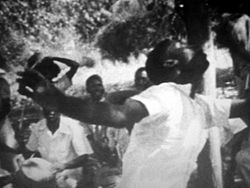
Divine Horsemen: The Living Gods of Haiti (film)
Encyclopedia

Documentary film
Documentary films constitute a broad category of nonfictional motion pictures intended to document some aspect of reality, primarily for the purposes of instruction or maintaining a historical record...
about dance and possession in Haiti
Haiti
Haiti , officially the Republic of Haiti , is a Caribbean country. It occupies the western, smaller portion of the island of Hispaniola, in the Greater Antillean archipelago, which it shares with the Dominican Republic. Ayiti was the indigenous Taíno or Amerindian name for the island...
an vodou that was shot by experimental filmmaker Maya Deren
Maya Deren
Maya Deren , born Eleanora Derenkowsky, was an American avant-garde filmmaker and film theorist of the 1940s and 1950s...
between 1947 and 1954.
In 1981, twenty years after Deren's death, the film was completed by Deren's third husband Teiji Ito
Teiji Ito
was a Japanese composer and performer. He is best known for his scores for the avant-garde films by Maya Deren.Ito was born in Tokyo, Japan into a theatrical family. His father, Yuji Itō, was a composer and costume designer, and his mother, Teiko Ono, was a dancer who worked in both traditional...
(1935-1982) and his wife Cherel Winett Ito (1947-1999). Most of the film consists of images of dancing and bodies in motion during rituals in Rada and Petro services.
Deren had studied dance as well as photography and filmmaking. She originally went to Haiti with the funding from a Guggenheim fellowship
Guggenheim Fellowship
Guggenheim Fellowships are American grants that have been awarded annually since 1925 by the John Simon Guggenheim Memorial Foundation to those "who have demonstrated exceptional capacity for productive scholarship or exceptional creative ability in the arts." Each year, the foundation makes...
and the stated intention of filming the dancing that forms a crucial part of the vodou ceremony. In 1953, Deren's book Divine Horsemen: The Voodoo Gods of Haiti, on the subject of vodou, was published by Vanguard Press
Vanguard Press
The Vanguard Press was a United States publishing house established with a $100,000 grant from the left wing American Fund for Public Service, better known as the Garland Fund. Throughout the 1920s, Vanguard Press issued an array of books on radical topics, including studies of the Soviet Union,...
.
The film that resulted, however, reflected Deren's increasing personal engagement with vodou and its practitioners (Wilcken, 1986). While this ultimately resulted in Deren disregarding the guidelines of the fellowship, Deren was able to record scenes that probably would have been inaccessible to other filmmakers.
Deren's original notes, film footage, and wire recordings are in the Maya Deren Collection at Boston University
Boston University
Boston University is a private research university located in Boston, Massachusetts. With more than 4,000 faculty members and more than 31,000 students, Boston University is one of the largest private universities in the United States and one of Boston's largest employers...
's Howard Gotlieb Archival Research Center and at Anthology Film Archives
Anthology Film Archives
__notoc__Anthology Film Archives is a film archive and theater located at 32 Second Avenue on the corner of East Second Street in the East Village neighborhood of Manhattan, New York City devoted to the preservation and exhibition of experimental film. It is the only non-profit organization of its...
.

